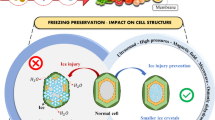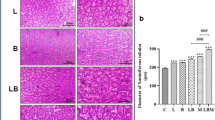Abstract
Purpose
In-situ preservation of cauda epididymal spermatozoa at -10°C with electrolyte free media for obtaining maximum functional gametes than preservation at 5°C.
Methods
Electrolyte free media prepared with soybean lecithin-glycerol, Coenzyme Q10 — glycerol and soybean lecithin — Coenzyme Q10— glycerol were inoculated separately into ligated cauda epididymides, equilibrated 2 h at 5°C, wrapped with aluminium foil and freezed at — 10°C. Spermatozoan characters were evaluated 7 and 21 days after thawing at 38.5°C in a water bath for 5 min.
Results
Spermatozoan characteristics were diminished gradually and significantly (p < 0.001, p < 0.05) between the media and observation days. Soybean lecithin-CoenzymeQ10-glycerol effectively protected spermatozoa against cold shock where spermatozoan progressive motility, viability, hypo-osmotic swelling positivity were 30.2 ± 0.62; 45.2 ± 0.82 and 41.6 ± 0.79 percent respectively on day 21.
Conclusion
This method can be adopted in field conditions for transportation of frozen epididymides and re-utilization of maximum functional gametes to conserve valuable animals after postmortem / slaughter.
Similar content being viewed by others
References
Foote RH. Letter to the Editor. J. Androl. 2000;21(3):355.
Anel L, Guerra C, Alvarez M, Kaabi M, Anel E, Boixo JC, et al. Basic parameters in spermatozoa recovered post-mortem from the Spanish Cantabrian Chamois (Rupicapra pyrenaica parva). Theriogenology. 2000;53(1):323. abstract.
Blash S, Melican D, Gavin W. Cryopreservation of epididymal sperm obtained at necropsy from goats. Theriogenology. 2000;54(6):899–905.
Kilian I, Lubbe K, Bartels P, Friedmann Y, Denniston RS. Evaluating epididymal sperm of African wild ruminants: Longevity when stored at 4°C and viability following cryopreservation. Theriogenology. 2000;53(1):330. abstract.
Lubbe K, Bartels P, Kilian I, Friedmann Y, Godke RA. Comparing motility and morphology of horse, zebra and rhinoceros epididymal spermatozoa when cryopreserved with two different cryodiluents or stored at 4°C. Theriogenology. 2000;53(1):338. abstract.
Soler AJ, Perez-guzman MD, Grade J. Storage of red deer epididymides for four days at 5°C: effects on motility, viability and morphological integrity. J. Exp. Zool. Part A: Comparative Exp. Biol. 2003;295A:188–99.
Martinez-Pastor F, Guerra C, Kabbi M, Diaz AR, Anel E, Herraez P, et al. Decay of sperm obtained from epididymis of wild ruminants depending on postmortem time. Theriogenology. 2005;63(1):24–40.
Dong Q, Rodenberg SE, Huang C, Vandevoort CA. Cryopreservation of Rhesus monkey (Macaca muitatta) epididymal spermatozoa before and after refrigerated storage. J. Androl. 2008;29(3):283–92.
James AN, Green H, Hoffman S, Landry AM, Paccamonti D, Godke RA. Preservation of equine sperm stored in the epididymides at 4°C for 24, 48, 72 and 96 Hours. Theriogenology. 2002;58:401–4.
Yu I, Leibo SP. Recovery of motile, membrane-intact spermatozoa from canine epididymides stored for 8 days at 4°C. Theriogenology. 2002;57:1179–90.
Fournier-Delpech S, Colas G, Courot M, Ortavant R, Brice G. Epididymal sperm maturation in the ram: motility, fertilizing ability and embryonic survival after uterine artificial insemination. Ann. Biol. Anim. Bioch. Biophys. 1979;19(3A):597–605.
Niwa K, Ohara K, Hosoi Y, Iritani A. Early events of in-vitro fertilization of cat eggs by epididymal spermatozoa. J. Reprod. Fertil. 1985;74(2):657–60.
Temple-Smith PD, Southwick GJ, Yates CA, Trounson AO, de Kretser DM. Human pregnancy by in vitro fertilization (IVF) using sperm aspirated from the epididymis. J. In Vitro Fertil. Embryo Transfer. 1985;2:119–222.
Marks SL, Dupuis J, Mickelsen WD, Memon MA, Platz CC. Conception by use of postmortem epididymal semen extraction in a dog. J. Anim. Vet. Med. Assoc. 1994;204(10):1639–40.
Graff KJ, Chandler JE, Reggio BC, Lim JM, Canal A, Carter JA, Meintjes M, Godke RA: Pregnancies obtained from IVF with noncapacitated epididymal bovine spermatozoa. Proc. 3rd Intern’l. Mtg. Biotech. Anim. Reprod. Cairo, Egypt (Nov. 2–6). 1996: pp. 19–21.
Bonduel M, Wilikens A, Buysse A, Van Assche E, Devroey P, Van Steirteghem AC, et al. A follow-up study of children born after intracytoplasmic sperm injection (ICSI) with epididymal and testicular spermatozoa and after replacement of cryopreserved embryos obtained after ICSI. Hum. Reprod. 1998;13(Suppl 1):196–207.
Morrell JM, Nubbemeyer R, Heistermann M, Rosenbusch J, Kuderling I, Holt W, et al. Artificial insemination in Callithrix jacchus using fresh or cryopreserved sperm. Anim. Reprod. Sci. 1998;52(2):165–74.
Bartels P, Lubbe K, Kilian I, Friedmann Y, van Dyk G, Mortimer D. In vitro maturation and fertilization of lion (Panthera leo) oocytes using frozen-thawed epididymal spermatozoa recovered by cauda epididymectomy of an immobilized lion. Theriogenology. 2000;53(1):325. abstract.
Kusunoki H, Daimaru H, Miami S, Nishimoto S, Yamane K-I, Fukumoto Y. Birth of a chimpanzee (Pan troglodytes) after artificial insemination with cryopreserved epididymal spermatozoa collected postmortem. Zoo. Biol. 2001;20:135–43.
Ikeda H, Kikuchi K, Noguchi J, Takeda H, Shimada A, Mizokami T, et al. Effect of preincubation of cryopreserved porcine epididymal sperm. Theriogenology. 2002;57:1309–18.
Martins CF, Rumpf R, Pereira DC, Dode MN. Cryopreservation of epididymal bovine spermatozoa from dead animals and its use in in-vitro embryo production. Anim. Reprod. Sci. 2007;101:326–31.
Said S, dan Saili T. Rescuing genetic material of unexpectedly die animal. Jurnal Ilmu Ternak dan Veteriner. 2007;12(2):147–52.
World health Organization: WHO Laboratory manual for the examinations of human semen and sperm-cervical mucus interaction (3e). Cambridge; The press syndicated of the University of Cambridge. 1997.
Sidhu KS, Guraya SS: In: Buffalo bull semen morphology, biochemistry, physiology and methodology. USA publishers and distributors, Ludhiana, India. 1985a; 152–154.
Jeyendran RS, Vandervent HH, Perez-Paleac ZM, Crabo BG, Zaneveld LJD. Development of an assay to assess the functional integrity of human sperm membrane and its relationship to other semen characteristics. J. Reprod. Fertil. 1984;70:219–25.
Duncan DB. Multiple range and multiple F tests. Biometrics. 1955;11:1–42.
Scott TW, Voglmayer JK, Setchell BP. Lipid composition and metabolism in testicular and ejaculated spermatozoa. The Biochemical Journal. 1967;102:456–60.
Arora R, Dinakar N, Prasad MRN. Biochemical changes in the spermatozoa and luminal contents of different regions of the epididymis of the rhesus monkey, Macaca mulalta. Contraception. 1975;11:689–700.
Hammerstedt RH, Keith AD, Hay S, Deluca N, Amann RP. Changes in ram sperm membrane during epididymis transit. Arch. Biochem. Biophys. 1979;196:7–12.
Thun R, Hurtado M, Janett F. Comparison of Biociphos-plus and TRIS-egg yolk extender for cryopreservation of bull semen. Theriogenology. 2002;57:1087–94.
Mancini A, Marinis LD, Oradei A, Hallgass ME, Conte G, Pozza D, et al. Coenzyme Q10 concentration in normal and pathological Human seminal fluid’s. J. Androl. 1994;15(6):591–4.
Jones R, Mann T. Damage to ram spermatozoa by peroxidation of endogenous phospholipids. J.Reprod. Fertil. 1977;50:261–8.
Ernster L, Forsneark-Andree P. Ubiquinol: an endogenous antioxidant in aerobic organisms. Clin. Invest. 1993;71:S60–65.
Ernster L, Dallner G. Biochemical, physiological and medical aspects of ubiquinone function. Biochem. Biophys. Acta. 1995;1271:195–204.
Lewin A, Lavon H. The effect of Coenzyme Q10 on sperm motility and function. Molecular Aspects of Medicine. 1997;18(Suppl):S 213–9.
Thomas SR, Neuzil J, Stocker R. Co supplementation with coenzyme Q prevents the prooxidant effects of alphatocopherol and increase the resistance of LDL to transition metal-dependent oxidation initiation. Arterioscler. Thromb. Vasc. Biol. 1996;16:687–96.
Thomas SR, Neuzil J, Stocker R. Inhibition of LDL oxidation by ubiquinone-10. A protective mechanism for coenzyme Q in atherogenesis? Mol.Aspects. Med. 1997;18:S85–103.
Booth NH, McDonald LE. Veterinary pharmacology and Therapeutics. 6th ed. New Delhi: Kalyani publisher; 1982.
Mazzilli F, Cerasaro M, Bisanti A, Rossi T, Dondero F: Seminal parameters and the swelling test in patients with sperm before and after treatment with ubiquinone (CoQ10). 2nd international symposium on reproductive medicine. Acta Medica, Edizioni e Congresi, Rome, Italy: Fiuggi. 1988; 71.
Ball BA, Vo AT, Baumber J. Reactive oxygen species generation by equine spermatozoa. Am. J. Vet. Res. 2001;62:5508–15.
Hammerstedt RH, Graham JK, Nolan JP. Cryopreservation of mammalian sperm: What we ask them to survive. J. Androl. 1990;11:73–88.
Riddle VM, Lorenz N. Nonenzymic formulation of toxic levels of methylglyoxal from glycerol and dihydroxyacetone in Ringers phosphate suspensions of avian spermatozoa. Biochem, Biophy. Res. Commun. 1973;50:27–34.
Fahy GM, Lilley TH, Linsdell H, Douglas MS, Meryman HT. Cryoprotectant toxicity and cryoprotectant toxicity reduction: In search of molecular mechanisms. Cryobiol. 1990;27:247–68.
Watson PF. The effects of cold shock on sperm cell membranes. In: Morris GJ, Clark A, editors. Effects of Low temperatures on Biological membranes. London: Academic; 1981. p. 189–218.
Rodojcic L, Vukotic-Maletic V, Balint B. Current Knowledge on cryopreservation of spermattzoa, ovum cells and zygotes. Medicinski pregled. 1998;51(1–2):29–36.
Curry MR, Watson PF. Osmotic effects on ram and human sperm membranes in relation to thawing injury. Cryobiology. 1994;31(1):39–46.
Watson PF. Recent developments and concepts in the cryopreservation of spermatozoa and the assessment of their post-thawing function. Reprod. Fertility. Dev. 1995;7:747–869.
Harrison RAP, White IG. Glycolytic enzymes in the spermatozoa and cytoplasmic droplets of bull, boar and ram and their leakage after shock. J Reprod Fertil. 1972;30:105–15.
Simpson AM, White IG. Effect of cold shock and cooling rate on calcium uptake of ram spermatozoa. Anim. Reprod. Sci. 1986;12:131–43.
Robertson L, Bailey JL, Buhr MM. Effects of cold shock and phospholipase A2 on intact boar spermatozoa and sperm head plasma membranes. Mol. Reprod Dev. 1990;26:143–9.
Cotran RS, Kumar V, Robbins SL. Robbin’s Pathologic basis of disease. 4th ed. Philadelphia: WB Saunders Co; 1989. p. 9–16.
Bilodeau JF, Chatterjee S, Sired MA, Gagnon C. Levels of antioxidant defenses are decreased in bovine spermatozoa after a cycle of freezing and thawing. Mol. Reprod. Dev. 2000;55:282–8.
Quinn PJ. Principles of membrane stability and phase behavior under extreme conditions. J Bioenerg Biomembr. 1989;21:3–19.
Holt WV, North RD. The role of membrane —active lipids in the protection of ram spermatozoa during cooling and storage. Gamete Res. 1988;19:77–89.
De Leeuw FE, Chen HC, Colenbrander B, Verkleji AJ. Cold-induced ultra structural changes in bull and boar sperm plasma membranes. Cryobiology. 1990;27:171–83.
Buhr MM, Curtis EF, Kakuda NS. Composition and behavior of head membrane lipids of fresh and cryopreserved boar sperm. Cryobiology. 1994;31:224–38.
White IG. Lipids and calcium uptake of sperm in relation to cold shock and preservation: A review. Reproduction. Fertility. Dev. 1993;5(6):639–58.
Aitken RJ. Free radicals, lipid peroxidation and sperm function. Reprod. Fertil. Dev. 1995;7:659–68.
Drobinis EZ, Crowe LM, Berger T, Anchordoguy TJ, Overstreet JW, Crowe JH. Cold shock damage is due to lipid phase transitions in cell-membranes-a demonstration using sperm as a model. J. Exp. Zool. 1993;265:432–7.
Rao B, Soufir JC, Martin M. Lipid peroxidation in human spermatozoa as related to mid piece abnormalities and motility. Gamete Res. 1989;24:127–34.
Aitken RJ, West K, Buckingham DW. Leukocytic infiltration into the human ejaculate and its association with semen quality, oxidative stress, and sperm function. J. Androl. 1994;15:343–52.
Baumber J, Ball BA, Gravance CG, Medina V, Davies-Morel MC. The effect of reactive species on equine sperm motility, viability, acrosomal integrity, mitochondria membrane potential, and membrane lipid peroxidation. J.Androl. 2001;21:895–902.
Author information
Authors and Affiliations
Corresponding author
Additional information
Capsule In this method spermatozoa remaining within ligated cauda epididymides were treated with electrolyte free media and freezed at -10°C and were assessed after thawing.
Rights and permissions
About this article
Cite this article
Datta, U., Chandra Sekar, M., Hembram, M.L. et al. Development of a new method to preserve caprine cauda epididymal spermatozoa in-situ at -10°C with electrolyte free medium. J Assist Reprod Genet 26, 467–473 (2009). https://doi.org/10.1007/s10815-009-9344-4
Received:
Accepted:
Published:
Issue Date:
DOI: https://doi.org/10.1007/s10815-009-9344-4




